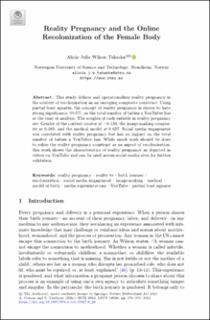| dc.contributor.author | Takaoka, Alicia Julia Wilson | |
| dc.date.accessioned | 2023-08-31T11:47:45Z | |
| dc.date.available | 2023-08-31T11:47:45Z | |
| dc.date.created | 2023-08-21T13:19:45Z | |
| dc.date.issued | 2023 | |
| dc.identifier.issn | 0302-9743 | |
| dc.identifier.uri | https://hdl.handle.net/11250/3086633 | |
| dc.description.abstract | This study defines and operationalizes reality pregnancy in the context of recolonization as an emerging composite construct. Using partial least squares, the concept of reality pregnancy is shown to have strong significance, 99.5%, on the total number of babies a YouTuber has at the time of analysis. The weights of each variable in reality pregnancy are: Gender of the content creator at −0.134, the image-making composite at 0.485, and the medical model at 0.627. Social media engagement was correlated with reality pregnancy but has no impact on the total number of babies a YouTuber has. While much work should be done to refine the reality pregnancy construct as an aspect of recolonization, this work shows the characteristics of reality pregnancy as depicted in videos on YouTube and can be used across social media sites for further validation. | en_US |
| dc.language.iso | eng | en_US |
| dc.publisher | Springer | en_US |
| dc.relation.uri | https://doi.org/10.1007/978-3-031-35927-9_20 | |
| dc.title | Reality Pregnancy and the Online Recolonization of the Female Body | en_US |
| dc.title.alternative | Reality Pregnancy and the Online Recolonization of the Female Body | en_US |
| dc.type | Peer reviewed | en_US |
| dc.type | Journal article | en_US |
| dc.description.version | publishedVersion | en_US |
| dc.rights.holder | Open Access | en_US |
| dc.source.journal | Lecture Notes in Computer Science (LNCS) | en_US |
| dc.identifier.cristin | 2168446 | |
| cristin.ispublished | true | |
| cristin.fulltext | original | |
| cristin.qualitycode | 1 | |
